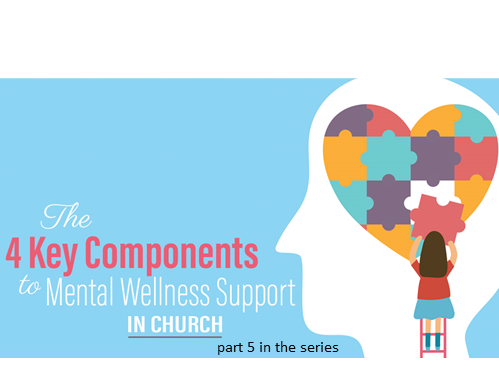
Taste and See God’s Goodness: The Jackson Willms Story
As I glanced out the front window and watched Jackson Willms and his care aide make their way up the...
Join us online at 9:00 am and 11:00 am Watch Online

Do you ever think about what you think about? Or how you think about what you think about?
This critical area of improving thoughts is the fourth component of mental wellness support in the church. As believers, the Word reveals to us how vital this is, as well as telling us that our spiritual and thought lives are connected:
“Put off… the old man which grows corrupt according to the deceitful lusts, and be renewed in the spirit of your mind, and … put on the new man.” (Ephesians 4: 22-24)
Don’t miss it! We’re told that by harnessing the power of our minds we can literally become new beings! So, let’s look a bit closer at how our minds work and how we can follow this exhortation.
Understanding the Power of our Minds
Think of the physical brain as a computer – the actual hard drive. Our mind, then, is like the software that has been loaded onto the hard drive. It enables us to deal with all aspects of life: developing relationships, setting goals and developing plans to achieve them, assessing problems and providing strategies for dealing with them.
Our minds create our thoughts – and we think all day long. Psychologists estimate that the average person has about 60,000 thoughts a day. (Please don’t ask me how they got that number.) Even a small percentage of bad thoughts is still enough to have very destructive impact on our choices and actions.
So how do we get our mental programs? It’s not like our parents buy “Thoughts and Emotions 2.0” and then install it into our brains.
Well, we’re programmed primarily through our relationships – not just with our parents, but also our siblings and others around us. Of course, once one accepts Jesus and has a relationship with Him, He will also influence one’s thought patterns, through His Spirit and His Word.
Through interactions with others we develop more and more ‘programs.’ In other words, concrete physical pathways, sequences of neurons firing, form in the brain. Sequences that happen repeatedly get set in a program, which will then run automatically in the future when ‘clicked on’ by certain cues.
Harmful Thought Patterns
Most of us have had the experience of a computer program that isn’t running properly. It just won’t do what you need it to, or do it as fast as you’d like it to. (I’m technologically challenged, so that seems to happen to me a lot!)
Because we live in a fallen world, many times our mental programming goes sideways. We end up having faulty thinking because things got wired in a not-so-helpful way.
Think of mindsets (perhaps a victim mentality), certain attitudes (pessimism, which is a ‘glass half-empty’ way of looking at things), and beliefs (“I’m a loser, I’m a failure”). All these are really just products of certain patterns of nerve firing.
Turning this around is simpler than you might think. (Just remember simple doesn’t necessarily mean easy!)
There are three interconnected areas:
1. Becoming aware of unhelpful thoughts;
2. Recognizing the untruths in them;
3. Actively changing the thoughts.
Keys to Transformation
As human beings, before we attempt change, we need to believe it’s possible. We are reassured by God that it is:
“And do not be conformed to this world, but be transformed by the renewing of your mind…” (Romans 12:2)
Once we know we can observe our own thoughts, our awareness grows. It can be immensely helpful to learn about common harmful thought patterns – in fancy doctor-speak they’re called cognitive distortions.
Likely you’ve already heard of some of them – black and white thinking, overgeneralizing and jumping to conclusions are just a few examples. Google ‘cognitive distortions’ and you can get more details.
As we become more conscious of these patterns, we then need to challenge them to recognize untruths. By far the best way to do this is by questioning them. Simply ask yourself, “Is that really true? Is there any objective evidence?”
This reveals why being in the Word is so critical. Scripture is where we learn about truth and grace. By knowing the truth of our identity – as children of God, made in His image, chosen before the foundation of the world, accepted and beloved – we can overcome many negative thoughts such as “I’m worthless” or “No one loves me.”
Growing in our understanding of grace is also imperative. It’s the ultimate antidote to the common fear, “I’m not good enough.” As believers, we know that through Christ, we are made righteous. How cool is that?
Moving Forward
I’d encourage you to learn more about harmful thought patterns and be in the Word as much as possible. Memorizing scripture helps a great deal in re-programming your mind.
But remember – the key is reading and meditating on the Word as much as possible.
Sometimes with high anxiety or severe depression you can’t focus due to physiological reasons. Do what you can – maybe it’s just repeating one verse – and don’t beat yourself up. If this is your situation, also consider seeking additional help from a Christian counsellor or through the Vibrant Life Ministry.
In my last post of this series, I’ll address the place of medication in supporting mental wellness.
Feel free to contact me with any questions at drczeg@gmail.com.
*************
Magda Czegledi has a unique perspective on mental health issues through her experience as a family doctor, a family member and as a patient. While experiencing a depression so severe she had to leave her family practice, she later recovered through a combination of her growing faith in Christ and basic lifestyle change. Currently, Magda works as a speaker, small group facilitator and peer support trainer.

As I glanced out the front window and watched Jackson Willms and his care aide make their way up the...

Several years ago, Pastor Blair Butterfield was at a pastors’ conference in Lima, Peru where he bumped into a man...

The world tells us we can do it all. Try hard enough, work enough hours, do all the right things...